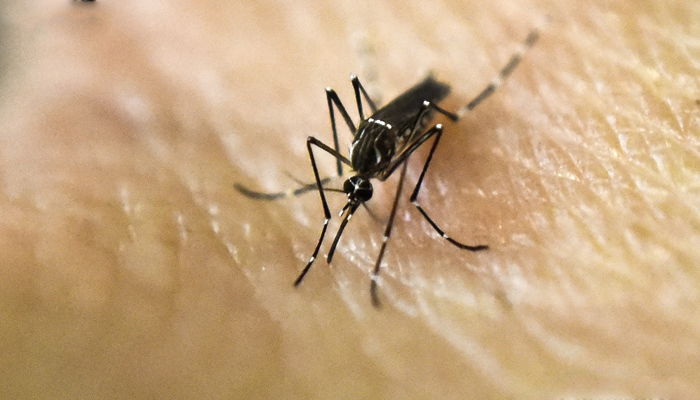Another 138 dengue cases from twin cities in 4 days
Islamabad: As many as 138 individuals belonging to Islamabad Capital Territory and Rawalpindi district have tested positive for dengue fever in the last four days showing that the incidence of the infection is still high.
Data collected by ‘The News’ on Monday has revealed that the average number of confirmed dengue fever patients being reported per day from the twin cities has dropped down to around 34 that was well over 55 a week back. So far, a total of 4464 patients have been confirmed positive for dengue fever from the twin cities though the infection has claimed no life from the region this year.
According to District Health Officer Islamabad Dr. Muhammad Zaeem Zia, the number of dengue fever patients being reported from ICT is continuously on the decline. In the last 24 hours, only seven individuals have tested positive from the federal capital including five from rural areas and two from urban areas.
He added the total number of patients so far reported from ICT has reached 2,215 of which 1411 have been reported from rural areas and 804 from urban areas in the federal capital. Another 86 confirmed dengue fever patients from other districts of the country have also been reported in the federal capital.
It is important that in the last four days, as many as 79 patients have been confirmed positive for dengue fever from Rawalpindi district while 59 from the federal capital. To date, a total of 2249 patients have been tested positive for dengue fever from Rawalpindi district. On Monday morning, as many as 73 dengue fever patients were undergoing treatment at public sector hospitals in Rawalpindi of which one was in critical condition. Health experts say that the number of dengue fever patients being reported from the twin cities is on a decline because the temperature has already fallen to a significant level. They believe that it is time for individuals to avoid mosquito contact particularly inside homes and offices as the indoor environment is still warmer enabling mosquitoes to bite and feed on humans.
-
 Northern Lights: Calm Conditions Persist Amid Low Space Weather Activity
Northern Lights: Calm Conditions Persist Amid Low Space Weather Activity -
 'Look What Andrew Has Done': Meghan Markle Defended On Jeremy Vine Show
'Look What Andrew Has Done': Meghan Markle Defended On Jeremy Vine Show -
 Apple, Google Agree To Make 'app Store' Changes Over UK Regulator Concerns
Apple, Google Agree To Make 'app Store' Changes Over UK Regulator Concerns -
 Autodesk Files Lawsuit Against Google Over AI Video Tool Trademark Dispute
Autodesk Files Lawsuit Against Google Over AI Video Tool Trademark Dispute -
 San Francisco 49ers Player Shot Near Post-Super Bowl Party
San Francisco 49ers Player Shot Near Post-Super Bowl Party -
 Kardashian-Jenner Clan Brings Lewis Hamilton Into The Fold: Watch
Kardashian-Jenner Clan Brings Lewis Hamilton Into The Fold: Watch -
 Meghan Markle 'quietly Dreaded' As Ex-best Friend Receives Lucrative Offer For Bombshell Memoir About Duchess
Meghan Markle 'quietly Dreaded' As Ex-best Friend Receives Lucrative Offer For Bombshell Memoir About Duchess -
 Blake Shelton, Gwen Stefani Make Big Move To Save Their Marriage
Blake Shelton, Gwen Stefani Make Big Move To Save Their Marriage -
 Google Warns Of State-sponsored Cyberattacks Targeting Defense Sector Employees
Google Warns Of State-sponsored Cyberattacks Targeting Defense Sector Employees -
 Ransom Deadline Passes: FBI Confirms ‘communication Blackout’ In Nancy Guthrie Abduction
Ransom Deadline Passes: FBI Confirms ‘communication Blackout’ In Nancy Guthrie Abduction -
 Jeff Bezos Hints At Blue Origin Moon Plans As Elon Musk Responds With Cautious Praise
Jeff Bezos Hints At Blue Origin Moon Plans As Elon Musk Responds With Cautious Praise -
 Zach Bryan Slams Turning Point USA Alternative Halftime Show: 'Embarrassing As Hell'
Zach Bryan Slams Turning Point USA Alternative Halftime Show: 'Embarrassing As Hell' -
 South Korea Blames Coupang Data Breach On 'management Failures,' Not Cyber Attack
South Korea Blames Coupang Data Breach On 'management Failures,' Not Cyber Attack -
 ‘Disgraced’ Andrew More Concerned About ‘issue Of His Legacy’ Than Epstein Links
‘Disgraced’ Andrew More Concerned About ‘issue Of His Legacy’ Than Epstein Links -
 Instagram Plans New Snapchat-style App ‘Instants’ Amid Rising AR Competition
Instagram Plans New Snapchat-style App ‘Instants’ Amid Rising AR Competition -
 Safer Internet Day 2026: Is Social Media Ban The Only Way To Protect Kids?
Safer Internet Day 2026: Is Social Media Ban The Only Way To Protect Kids?




